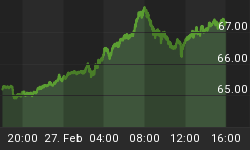Everyone needs someone to blame for heart failure at the pumps. The falling dollar, speculators, OPEC, Hummers, Bush, bubble this bubble that. We have all heard the rhetoric but few solutions.
The most widely held fallacy is that the falling dollar is a primary source for rising commodity prices. Sure, if you are buying oil in US dollars and the value of the dollar is lower, the amount of dollars to buy it does go up, but let's take it in context.
Over the past 16-months the US dollar has fallen by roughly 15-percent while oil has doubled in price. Since January 2005 crude oil has climbed 280-percent US, and 250-percent in euros. These figures show that the falling US dollar is merely the tail-wind.
When all else fails, blame Wall Street. This is a common diversion tactic that is picking up momentum in Washington. Democrats, with support from some Republicans, don't want to seem insensitive during an election year and not only have they set up panels to probe into the issue of oil speculation, we're now starting to see some wild legislative proposals, even from typically reasonable legislators.
In truth, however, speculation helps get the market to price discovery. For every buyer there is a seller and oil does not have cash settlement, meaning that funds have to sell the front month when they roll into the next. If the contract they have to sell was inflated merely because of speculation, then nobody would take the other side.
I do agree, however, that speculation does have an affect on daily price action. In the short term it's a popularity contest, but in the long run fundamentals win out. An example of the short term was seen last Friday when crude jumped nearly $11 a barrel. Not because of any fundamental change, but simply because Morgan Stanley analyst Ole Slorer said that he still expects crude to go for as much as $150 a barrel by the Fourth of July.
In the long run the basic principals of supply and demand set prices. The International Energy Agency estimates that oil demand in 2008 will climb 4.6-percent in the Middle East, 3.3-percent in Africa, 2.8-percent in Asia/Pacific, 2.4-percent in the Former Soviet Union with Europe being flat, and the US a modest 0.3-percent lower.
China and India's demand for oil is still in its infancy, pegged at around 1.3 barrels per person per year, compared to 4.4 barrels per person in the developed world. When their economies begin using half as much as the developed world the amount of worldwide consumption will nearly double.
The pandering politicians here in the U.S. and most recently French President Sarkozy are promoting temporary tax holidays, and other changes to energy taxes. This will only exacerbate the problem. One solution for high prices is even higher prices-in order to curb demand.
The only safe bet when it comes to oil prices, is volatility.
There remains plenty of blood in the streets left by the bears in recent attempts at calling a top. This makes short term predictions more likely of becoming self-fulfilling prophecies. I expect crude to surpass the $150 estimate by Morgan Stanley before its next significant correction.
Sign up for CNC Weekly Report. With commodity quotes, news, charts, insight and more...Commodity News Center is your home for commodities online!















